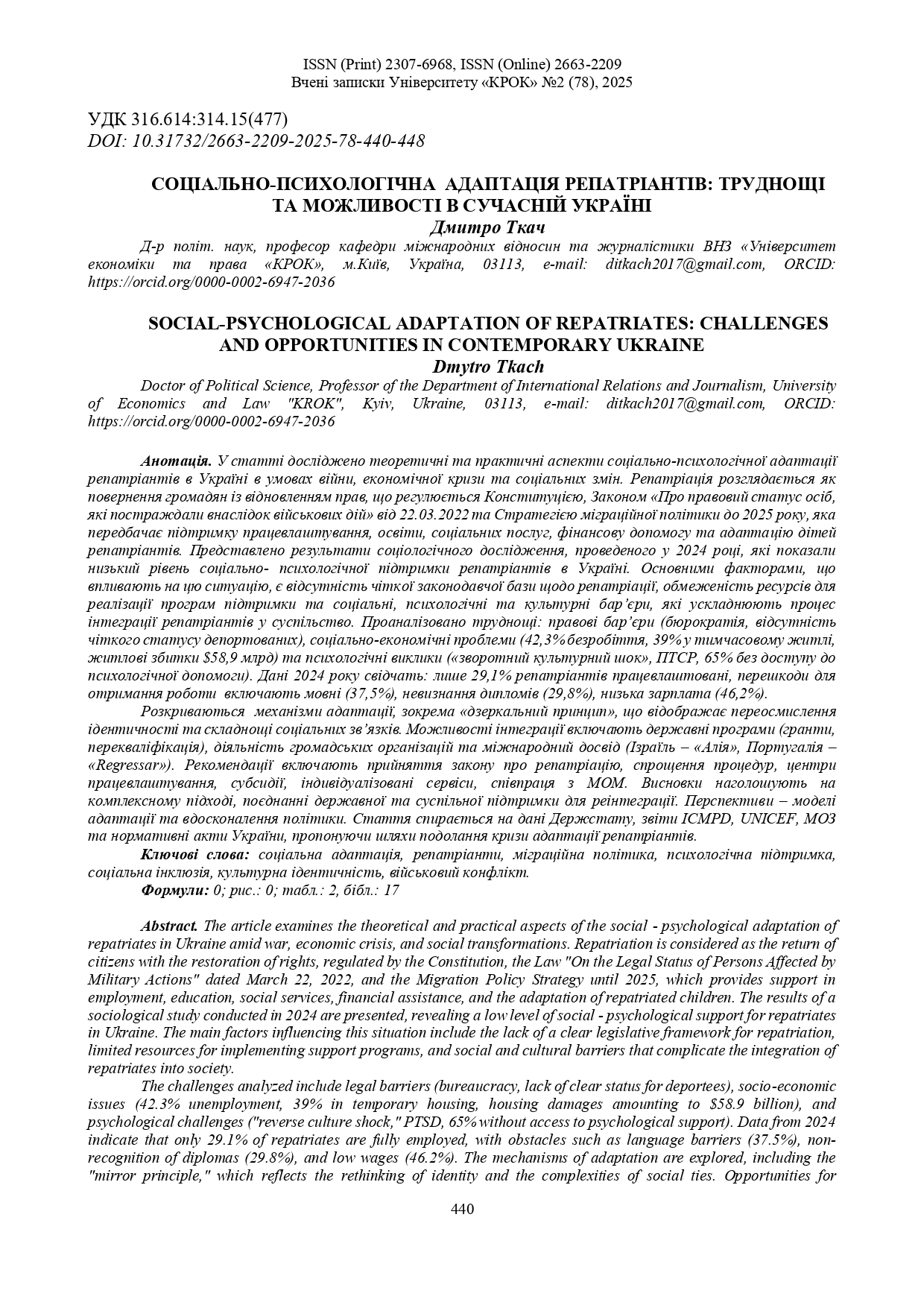SOCIAL-PSYCHOLOGICAL ADAPTATION OF REPATRIATES: CHALLENGES AND OPPORTUNITIES IN CONTEMPORARY UKRAINE
DOI:
https://doi.org/10.31732/2663-2209-2025-78-440-448Keywords:
social adaptation, repatriates, migration policy, psychological support, social inclusion, cultural identity, military conflictAbstract
The article examines the theoretical and practical aspects of the social - psychological adaptation of repatriates in Ukraine amid war, economic crisis, and social transformations. Repatriation is considered as the return of citizens with the restoration of rights, regulated by the Constitution, the Law "On the Legal Status of Persons Affected by Military Actions" dated March 22, 2022, and the Migration Policy Strategy until 2025, which provides support in employment, education, social services, financial assistance, and the adaptation of repatriated children. The results of a sociological study conducted in 2024 are presented, revealing a low level of social - psychological support for repatriates in Ukraine. The main factors influencing this situation include the lack of a clear legislative framework for repatriation, limited resources for implementing support programs, and social and cultural barriers that complicate the integration of repatriates into society.
The challenges analyzed include legal barriers (bureaucracy, lack of clear status for deportees), socio-economic issues (42.3% unemployment, 39% in temporary housing, housing damages amounting to $58.9 billion), and psychological challenges ("reverse culture shock," PTSD, 65% without access to psychological support). Data from 2024 indicate that only 29.1% of repatriates are fully employed, with obstacles such as language barriers (37.5%), non-recognition of diplomas (29.8%), and low wages (46.2%). The mechanisms of adaptation are explored, including the "mirror principle," which reflects the rethinking of identity and the complexities of social ties. Opportunities for integration include state programs (grants, retraining), the activities of civil society organizations, and international experiences (Israel’s "Aliyah," Portugal’s "Regressar").
Recommendations include adopting a repatriation law, simplifying procedures, establishing employment centers, providing subsidies, offering individualized services, and collaborating with the IOM. The conclusions emphasize a comprehensive approach, combining state and societal support for reintegration. Prospects involve adaptation models and policy improvements. The article relies on data from the State Statistics Service, ICMPD reports, UNICEF, the Ministry of Health, and Ukraine’s regulatory acts, proposing ways to address the repatriate adaptation crisis.
Downloads
References
Гнатюк, Т. О. (2013). Проблеми інтеграції репатріантів в українське суспільство. Наукові праці [Чорноморського державного університету імені Петра Могили]. Сер. : Політологія, 212(200), 56-61. http://nbuv.gov.ua/UJRN/Npchdupol_2013_212_200_13
Звіт DRC щодо моніторингу потреб у соціально-правовому захисті в Україні. Квітень – червень 2024. (2024). https://drc.ngo/media/rkmpndj5/drc-qpmr_april-june_2024_ua_19_08_24.pdf
Закон України "Про правовий статус осіб, які постраждали внаслідок військових дій" № 2435-IX. (2022, 22 березня). Офіційний вісник України, 29, 42.
Зінченко, О. С. (2015). Теоретичні засади дослідження соціально-психологічної адаптації внутрішньо переміщених осіб. Актуальні проблеми соціології, психології, педагогіки, 4, 47-53.
Кабінет Міністрів України. (2017, 12 липня). Розпорядження № 482-р. Про схвалення Стратегії державної міграційної політики України на період до 2025 року. https://zakon.rada.gov.ua/laws/show/482-2017-%D1%80#Text
Кабінет Міністрів України. (2024, 3 вересня). Розпорядження № 837-р. Про затвердження плану заходів на 2024 і 2025 роки щодо реалізації Стратегії державної міграційної політики України на період до 2025 року. https://zakon.rada.gov.ua/laws/show/837-2024-%D1%80#Text
Климчук, В. О. (2015). Мотиваційно-дискурсивна фасилітація у практиці психологічної допомоги при депресії травматичного генезису. В Т. М. Титаренко (Ред.), Психологічна допомога особистості, що переживає наслідки травматичних подій. Збірник статей (с. 14-25). Міленіум.
Коваленко, О. Р. (2023). Соціальна адаптація репатріантів у контексті військового конфлікту. Український соціум, 4(45), 56-72.
Конституція України. (1996). Відомості Верховної Ради України, 30, ст. 141. https://zakon.rada.gov.ua/laws/show/254%D0%BA/96-%D0%B2%D1%80#Text
Котеленець, К. М., Нужна, Ю. С., & Хобта, С. В. (2024). Особливості адаптації вимушених мігрантів під час українсько-російської війни: теоретичні засади дослідження. http://habitus.od.ua/journals/2024/60-2024/5.pdf
Малиновська, О. А., & Коломієць, О. О. (2017). Міграційний аспект гібридної війни Росії проти України. Демографія та соціальна економіка, 2, 78-88. http://nbuv.gov.ua/UJRN/dse_2017_2_7
Марченко, Т. М. (2023). Вплив повномасштабної війни на репатріацію українців: соціальні аспекти. Війна & Суспільство, 1, 88-102.
Петренко, І. І., & Шевченко, М. С. (2022). Реінтеграція вимушених мігрантів: досвід України. Міграційні дослідження, 12, 34-49.
Пищуліна, О. М. (2024). Дослідження гендерної специфіки вимушеної міграції з України до ЄС в умовах військового конфлікту. https://razumkov.org.ua/images/2024/01/29/2024-Pyshchulina-EDNANNYA-SITE.pdf
Попко, В. В. (2025). Єднання та репатріація: від ідеї до втілення. https://daily.rbc.ua/rus/show/ednannya-ta-repatriatsiya-vid-ideyi-vtilennya-1739876553.html
Рибальська, Н. (2025). Як Україна відповідає на житлову кризу? Розбираємось із програмами та ініціативами. https://hmarochos.kiev.ua/2025/02/10/yak-ukrayina-vidpovidaye-na-zhytlovu-kryzu-rozbyrayemos-z-programamy-ta-inicziatyvamy/
Zapf, M. K. (1991). Cross-cultural transitions and wellness: Dealing with culture shock. International Journal for the Advancement of Counselling, 14, 105-119.

Downloads
Published
How to Cite
Issue
Section
License

This work is licensed under a Creative Commons Attribution-NonCommercial 4.0 International License.

